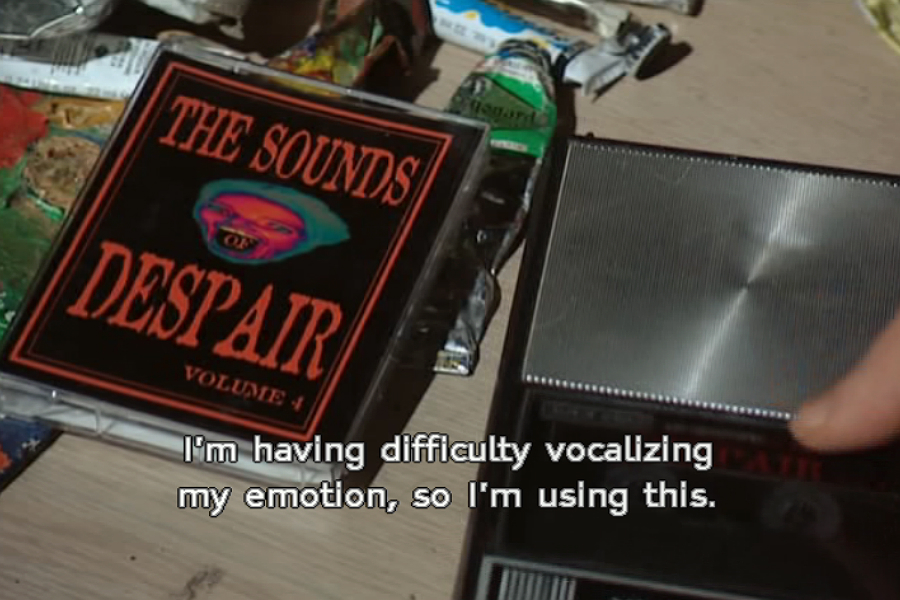Fluxus Fest, Feelings and Fraktures

A chance visit to a performance piece at the Bluecoat gets Mikey Stevenson thinking about the murky world of emotional outsourcing…
I noticed a pattern forming in my behavior recently. I’ve amassed an arsenal of YouTube clips that I enjoy watching over and over again.
These include goats ‘screaming’ like humans, a Margaret Cho standup clip where she explains how she reacted like a ‘Korean Courtney Love’ to criticism of her show by a prominent Korean community leader and an episode of Spaced where Brian immerses himself in The Sounds of Despair (Volume 4) and explains “I’m having difficulty vocalizing my emotion, so I’m using this”.
It was only on reflection that I realized I have been doing what Brian had been doing. Sparing you the details, I’ve been going through a tough time. Like the recently jilted lover listening to sad songs, the experience of watching someone express despair or anger, or of goats making sounds that resemble screams, can feel oddly therapeutic.
This is not a new phenomenon. Contemporary philosopher, Slavoj Žižek, explains through his reading of Lacan (in his appropriately titled book How to Read Lacan) ‘Some figure can take over from us and experience for us our innermost and most spontaneous feelings and attitudes, inclusive of crying and laughing. In some societies, the same role is played by so-called “weepers” (women hired to cry at funerals).’
This doesn’t just apply in a traditional or ancient cultural context: ‘think about the canned laughter on a TV show, when the reaction of laughter to a comic scene is included in the soundtrack itself. Even if I do not laugh, but simply stare at the screen, tired after a hard day’s work, I none the less feel relieved after the show, as if the soundtrack has done the laughing for me.’
Something else struck me. As with the paid mourners, these clips are not actually ‘real’ or acute experiences of the emotion. Margaret is recounting her story, she’s replicating her anger. The goats merely sound like they are screaming and Brian is a fictional character listening to a recording made by Spaced’s director Edgar Wright.
My favourite is the Spaced clip, because ‘the sounds of despair Volume 4’ (pictured above) is a fictional product specifically intended to outsource self-expression. This underlines the genius of Simon Pegg, Jessica Stevenson and Wright, and the depth of their writing. In the Spaced universe objects like this actually exist and although in the real world you can buy the sound of sobbing on Amazon, I don’t think that this is its intended purpose.
Like bereaved families hiring mourners, I’ve outsourced my emotional expression, but not necessarily my feelings. In the current financial climate, things aren’t easy and people are working hard to change their situations, to affect an outcome. For me there hasn’t been time to sit and dwell, there’s been a sense that moping is a luxury I simply can’t afford when faced with harsh realities.
What is inescapably true is that I enjoy watching my collection of clips. Žižek explains that this sense of satisfaction comes from something else doing the work for me. Like a waterwheel milling wheat, the Miller does not credit the water for doing the work, but feels satisfied in the achievement of their goal. My clips are a collection of outspoken loudmouths and they express my emotional state without reservation. They do the work that I feel I cannot do. They do the work it is dangerous for me to do.
By chance rather than design, I touched on the ultimate experience of outsourced emotion last week, when I attended Frakture’s Acoute VI:Fluxus Fest at the Bluecoat. Described as ‘an action-packed look into the conceptual world of Fluxus, a group of radical young artists in the 1960s who gained notoriety for their anarchic performances, influenced by John Cage, Marcel Duchamp and Dada’, the fest was a genuinely chaotic, raw and emotional experience.
From the intense screams of Yoko Ono’s Voice Piece for Soprano and Dick Higgins’ Danger Music No. 17 to the barking mad Emotional Duet by Emmett Williams (where a pair of performers slapped themselves and then each other until a full-on brawl developed), the audience hugely enjoyed the performance, people jumping out of their chairs, prairie-dogging and rubber-necking, amazed at the unhinged view before them, which was genuinely playful and exciting, shockingly direct and refreshingly free of musical snobbery.
Over the past 6 Acoute events, Frakture have explicitly shown that free improvised music is relevant, exciting and important and can pack more relevance, emotional punch and meaning than most contemporary pop music, making their next event something to look forward to, whether I need to outsource any more emotions or not at that point.
Mikey Stevenson





